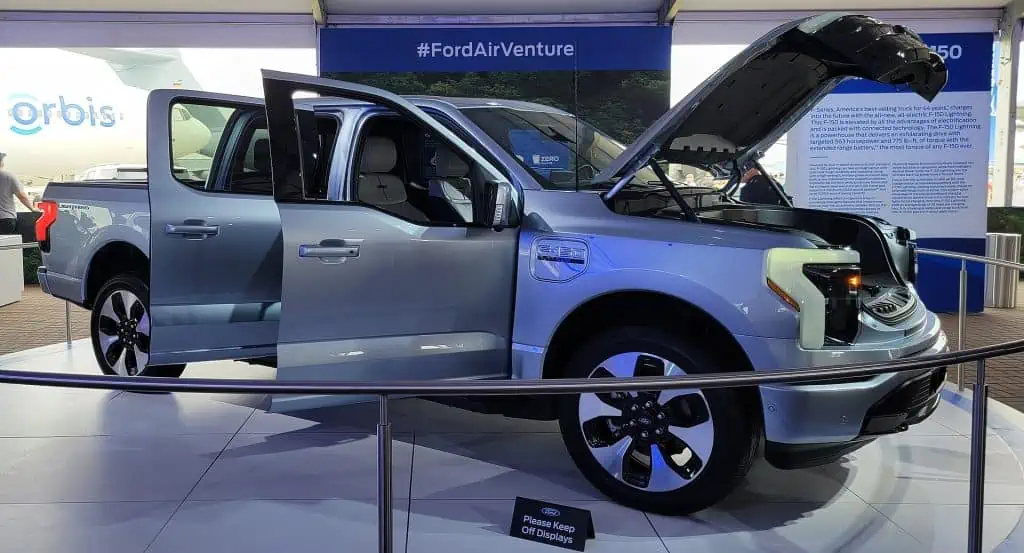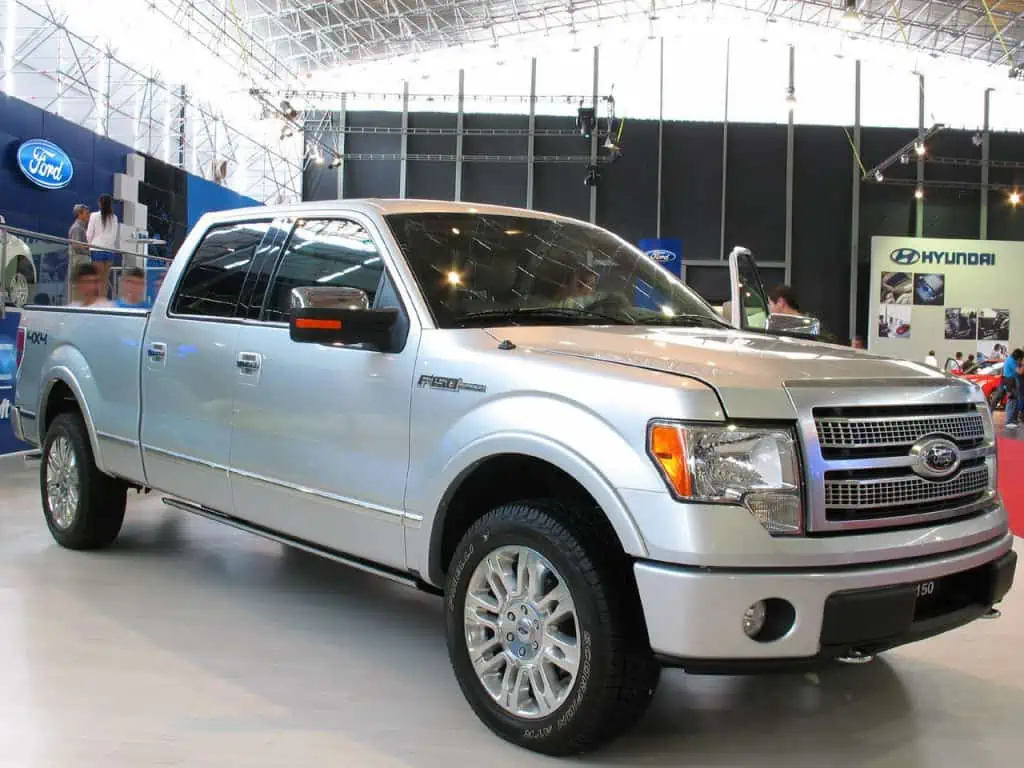Ever consider purchasing a truck with a diesel engine? I must admit that I never gave it much thought myself. However, the more I read about diesel and its benefits over gasoline engines, the more I became interested in them.
Diesel engines have a reputation for being durable. Large engines for large vehicles. But if you invest, you’ll quickly learn to value their better toughness and fuel economy. Therefore, test drive a Super Duty Ford truck with a tough and dependable diesel engine if you wish to be a working-class hero.
The newest and best Ford Diesel engine ever produced is the 6.7L Turbo-Diesel Power Stroke engine, which was introduced in 2019. We’ll go over all the previous Power Stroke models and examine why the 6.7L Turbo represented such a significant improvement over earlier models.
The 7.3 Powerstroke, 6.7 Powerstroke, and 3.0 Powerstroke are the “best Ford diesel engines.” The most dependable diesel engine is the 7.3 Powerstroke, which has an average lifespan of between 250,000 and 300,000 kilometers. The 6.7 Powerstroke, on the other hand, has the highest towing capacity at 23,000 pounds.
I have been able to compile enough information after doing a lot of research on automotive and mechanic forums to decide which Ford diesel engines are the finest. According to my research, several diesel engines from Ford are well taken into account because some are better for power and performance while others are better for reliability.
Gasoline Vs Diesel
1. The Engine Types
Let’s quickly go through the distinctions between diesel and gasoline engines in case you are unfamiliar.
Ford F-150 Lightning power stroke diesel engine truck by Xboxcarsforza1 / CC BY-SA 4.0. The 6.7-liter Power Stroke V8 diesel is one of Ford’s best engines. The most modern 6.7-liter Power Stroke engine makes an astounding 1,050 lb-ft of torque and 475 horsepower. This enables the diesel engine to haul at least 20,000 pounds.
Each uses an internal combustion engine to transform the chemical energy contained in the fuel’s chemical bonds into mechanical energy. The engine’s cylinders’ pistons are propelled by mechanical energy.
In turn, this causes the car’s wheels to move. Internal combustion refers to the process of converting chemical energy inside the engine through a series of tiny explosions.
Fuel and air are combined in gasoline engines, which are then compressed by piston action and ignited by spark plugs. The air is first compressed in diesel engines, which heats it.
(Remember Boyle’s law from earlier? from chemistry in high school? Temperature and pressure are inversely correlated.) Without a spark plug, fuel that has been injected into the compressed air instantaneously ignites.
2. The Fuel Types
Petroleum oil fractional distillates include both diesel and gasoline. While the technical distinctions between the two are somewhat difficult to describe, the general idea is that gasoline is made to resist igniting until a spark is supplied, whereas diesel is refined to be injected into compressed air.
Diesel offers overall superior fuel economy and has a higher chemical energy content than gasoline. In actuality, it ranks among the most effective fuels on the market right now. Diesel engines’ efficiency is partly a result of how they work.
A diesel engine can transform heat into mechanical energy and use it to drive the vehicle, whereas a gasoline engine just exhausts heat as waste energy through its tailpipe. Compared to its gasoline equivalent, it has a lot more torque.
An engine typically has 20% to 30% better mileage than an equivalent gasoline engine. Under the correct conditions, diesel engines can even outperform the fuel economy of hybrid gasoline-electric vehicles.
Gasoline engines can reach significantly higher top speeds, though. This is because a spark plug in a gasoline engine can instantly ignite the fuel and transform chemicals into mechanical energy with less compression needed, whereas diesel engines must wait for the air to heat up and ignite under pressure.
Because gasoline engines use less force to compress air, they are often lighter, which further increases their top speeds. Because of this, gasoline engines are favored in personal vehicles like cars and motorbikes.
Diesel is now more expensive than gasoline. This is mostly a result of the increased demand for heating oil, industrial and residential generators, and commercial shipping businesses for diesel fuel.
The Power Stroke Engines By Ford
Ford has been producing the Power Stroke engine series since 1994. It is without a doubt one of Ford’s most well-known and well-liked diesel engine models. Truckers use the Power Stroke as their “yardstick” to gauge an engine’s power and performance, according to Ford Autoworks in Ithaca, New York.
F-150 SVT Raptor power stroke diesel engine truck by NaBUru38 / CC BY 3.0. Between 1994 and 2003, the 7.3-liter Power stroke V8 was one of the most potent diesel engines available. With a maximum output of 250 HP and over 500 lb-ft of torque in its final years, the 7.3 is still a very powerful engine today.
Over the years, there have been several models, including the original 7.3L, 6.0L, 6.4L compound turbo, and, most recently, the 6.7L Turbo-Diesel Power Stroke. At the conclusion of this essay, we’ll discuss 3.2L and 3.0L engines as well.
Ford vehicles with diesel engines have long been a market favorite. But which diesel vehicles offer the most torque, power, and dependability? Let’s look at the top choices listed below.
The following are your best available options if a diesel Ford truck is something you are thinking about:
- The 6.7-liter Power Stroke V8
- The 7.3-liter Power Stroke V8
- The 3.0-liter Power Stroke V6
Like any automaker, Ford had its good and bad years with its diesel vehicles. We’ll look more closely at why these are the best diesel engines Ford has ever made in this post. Continue reading so that we can address further frequently asked concerns about Ford diesel engines.
Which are the Best Ford Diesel Engines Ever Made?
You should examine factors like power, dependability, torque, and towing capacity when thinking about a diesel engine. While each of these factors matters when selecting a diesel engine, some may matter more to you than others.
When examining the Ford diesel engines, these groups are equally crucial. Undoubtedly, some perform better than others, but who among them is the best? We’ve done enough study to be able to recommend the top three Ford diesel engines.
Let’s look at them now.
1. The 6.7-Liter Power Stroke V8
One of Ford’s top engines is the 6.7-liter Power Stroke V8 diesel. The most recent 6.7-liter Power Stroke engine produces 475 HP and a staggering 1,050 lb-ft of torque. This allows the diesel engine to tow 20,000 lbs, at the very least.
When it comes to dependability, the 6.7-liter Power Stroke V8 is a reliable engine. It is one of Ford’s most dependable engines and should occasionally malfunction. The years 2011 through 2014 are ones to be on the lookout for.
These years were notorious for having EGR, emission, and turbo difficulties. If you can find a 2015 model or newer, you should be fine with the proper upkeep for 250,000 miles or more.
2. The 7.3 Liter Power Stroke V8
The 7.3-liter Power stroke V8 was one of the most potent diesel engines on the market between 1994 and 2003. The 7.3 is still a highly potent engine today, with a maximum output of 250 HP and approximately 500 lb-ft of torque in its last years.
The 7.3-liter’s straightforward design makes it a dependable option for many buyers. Many folks have safely covered well over 300,000 miles in their 7.3 without issues. Due to its capacity to tow up to 15,000 lbs, it is also a fantastic engine for towing.
2021 Ford F-150 Lariat Sport power stroke diesel engine truck by Democfest / CC BY-SA 2.0. The 3.0 liter Power Stroke V6 diesel engine is still extremely good even though it has less power than the 6.7 or 7.3 engines. This engine is perfect for towing up to 11,440 pounds because it has 440 lb-ft of torque and 250 horsepower.
The 7.3-liter engine should mostly be avoided from 2001 to 2003 owing to early PCM and camshaft position sensor failures. Considering that this engine is an older model, it is advisable to obtain a CarFax report to make sure it has been well-maintained. It is also worthwhile to request maintenance data from the previous owner.
Want the 7.3-liter engine’s greatest years? You do, of course! Look at the models from 1999 to 2000. These models included connecting rods made of forged steel, which could handle the added power. You will also receive the most recent turbo with a 3-inch pipe. With the right care, these years will be very useful to you.
3. The 3.0 Liter Power Stroke V6
Despite being less potent than the 6.7 or 7.3 engines, the 3.0 liter Power Stroke V6 diesel engine is still very good. With 440 lb-ft of torque and 250 HP, this engine is ideal for towing up to 11,440 pounds.
Since the V6 diesel only made its debut in 2018, it is difficult to assess its dependability. However, if you are ready to take a chance, you will get a combination of good fuel economy and towing capacity. The 3.0-liter diesel engine, according to Ford, will achieve 30 mpg on the highway.
The Ford F-150 diesel’s drawback is its high price. The diesel engine will cost $4,000 more than the gas-powered alternative. Another concern is whether paying more than for a gas engine is worthwhile.
With 400 HP and 500 lb-ft of torque, the most potent gas engine for the Ford F-150 outperforms the 3.0 diesel. Additionally, according to Ford, the 3.5-liter twin-turbo EcoBoost engine has a maximum towing capacity of 14,000 lbs in 2021, which is a major improvement over the V6 diesel.
The V6 diesel is unquestionably a fantastic engine option, but it might not be the Ford F-150’s ideal engine.
Which are the Ford Diesel Engines to Avoid and Why?
Now that you are aware of the three “best Ford diesel engines,” it is critical to know which years to stay away from. These diesel engines were unreliable and came with high repair costs for owners. Let’s look at them down below.
1. The 6.0-Liter Power Stroke V8
You may buy the 6.0-liter Power Stroke online and at nearby dealerships. However, that isn’t a good indicator, in case you were wondering. They are so cheap and numerous because they are afflicted with problems.
The head gasket, the oil cooler, the turbo, the EGR, and the injection system are a few of the most typical problems. Unfortunately, these components are prone to breaking down, which could result in a costly repair.
Most customers who had the misfortune of purchasing this engine had to turn to repair kits. The engine is more dependable after the repair kits are installed, but it’s still not the best choice.
2016 F-150 power stroke diesel engine truck by Kevauto / CC BY-SA 4.0. The 6.0-liter Power Stroke is available for purchase online and at neighboring dealerships. But in case you were wondering, that’s not a good sign. They have issues, which explains why they are so inexpensive and plentiful.
Some of the 6.0-liter’s strengths are practical power and quick throttle response. While we would like to suggest some excellent years to take into consideration, it is best to avoid any 6.0-liter Power Stroke V8 regardless of how alluring the pricing is.
2. The 6.4-Liter Power Stroke V8
Even though the 6.4-liter power stroke engine doesn’t have as many problems as the 6.0-liter engine, it should still be avoided. It’s poor fuel economy is the cause. Adding an emissions eliminator is the only way to avoid blowing your petrol budget.
Customers frequently complained about broken pistons, malfunctioning injection systems, and failure of pollution controls. The trouble is not worth the expensive repairs.
Additionally, the 6.4-liter engine won’t last as long between major repairs as other diesel engines. Expect to replace the fuel injectors, fuel pumps, and pistons at 200,000 miles.
The truck does have some standout features, such as a highly responsive turbo that produces excellent top-end power. The 6.4-liter engine can be highly customized because it is simple to add additional items.
There are some 6.4-liter Power Stroke V8s for sale that have received good maintenance, but we advise staying away from this engine.
Are Ford Diesel Engines More Powerful?
Diesel engines provide more torque than gas engines because they have higher compression ratios; the higher compression ratio is brought on by the higher cylinder temperature and pressure.
The larger turbochargers and injectors found in diesel engines also contribute to their ability to produce more power. The drawback is that diesel engines tend to cost more than their gas-powered counterparts.
Diesel engines generate more torque, which is excellent for pulling and carrying, even if they may not necessarily create more power.
How Does a Ford Diesel Engine Gain More Power?
It is possible to modify diesel engines to generate increased power and torque. To enhance the compression ratio, airflow, and fuel delivery, aftermarket items can be added. Here are some easy techniques to boost your diesel engine’s power:
1. Replacing the Kit for Air Intake
Performance can be enhanced by switching out the factory air intake for an aftermarket system.
The air intake device will also pull in outside air to provide the engine with cooler air. The engine can generate more power when the air is cooler because it is denser and contains more oxygen.
2. Use of Enhanced Fuel Injectors
Your diesel engine can supply more gasoline and produce a more potent explosion in the cylinders if it has improved fuel injectors.
A 2018 Ford F-150 XLT power stroke diesel engine by Kevauto / CC BY-SA 4.0. The 6.4-liter engine should be avoided even though it doesn’t have as many issues as the 6.0-liter engine. The problem is with its poor fuel economy. The only way to stop blowing your gas budget is to add an emissions eliminator.
By doing this, the engine will be able to produce more torque and power while using diesel fuel. Additionally, your fuel economy may increase.
3. Installation of Exhausts for High Performance
A performance exhaust system will enhance airflow, similar to an air intake system. The engine may more effectively release exhaust gases by lowering back pressure. The engine will be able to breathe more easily and generate more power as a result.
4. Utilizing a Tuner
The performance of the engine can be customized with a tuner. Your diesel engine’s power and torque can be increased by changing the tune. By doing so, you’ll instruct the computer to increase fuel injection and boost pressure.
5. Installing a High-Performance Turbocharger
A high-flow performance turbocharger can also be added to your diesel engine to boost its power output. More air will be delivered to the cylinders by the turbocharger as the air intake pressure rises.
How Good Is the Ford 7.3 Liter Engine?
The 7.3l Power Stroke is still a strong and dependable diesel engine, despite being an older model. The years 2001–2003 are best avoided, though, as PSMs and camshaft position sensors frequently malfunction.
It’s a good idea to ask the prior owner for any maintenance documents because the engine is older. The 1999 or 2000 versions are the finest years to purchase.
These trucks have connecting rods made of forged steel, which can handle the added power. You’ll also get the most recent turbo with a 3-inch pipe, which, with proper maintenance, may last for years.
What Ford Power Stroke Is the Best?
The 6.7 liter Ford trucks are some of Ford’s best creations. The greatest models are those made in 2015 and later; with routine maintenance, they can go great distances.
What Ford Diesel Engine Has the Best Reliability Score?
The Ford 7.3 liter V8 has established itself as one of the most dependable Ford diesel engines despite its advanced age. It stands out from other diesel models because of its advanced features, and Ford fanatics still adore it.
Points to Note
- The 7.3 Powerstroke Ford diesel engine, with an average lifespan of 250,000 to 300,000 miles, is the most dependable Ford diesel engine.
- The 6.7 Powerstroke Ford diesel engine, which can haul 23,000 lbs, is the most potent model available.
- The 3.0 Powerstroke Ford diesel engine offers the best value due to its strong mile-per-gallon rating, towing ability, and price point.
Ford F-150 Platinum power stroke diesel engine truck by Qwerty242 / CC BY-SA 3.0. For better or worse, Ford manufactures some of the most well-liked trucks in America. For a very long time, the automaker exclusively made heavy-duty trucks with diesel engines, such as the F-250 and F-350. 2018 saw the addition of the first-ever diesel F-150 to the lineup.
The Future of Ford’s Diesel Engines
Ford produces some of the most popular trucks in America, for better or worse. Heavy-duty trucks like the F-250 and F-350 were the only vehicles that the carmaker produced with diesel engines for a very long period. The first-ever diesel F-150 was added to the range in 2018.
The 3.0L Power Stroke engine that powered the F-150 as standard produced 250 horsepower and 440 lb.-ft of torque. But it’s unclear what the future holds for Ford’s iconic diesel engine given the arrival of EVs like the F-150 Lightning.
The Conclusion
The top and bottom-performing Ford diesel engines are listed here. Each engine has advantages and disadvantages, as you can see. As a result, it’s crucial to complete your homework before making a purchase. If you don’t, you can wind up with an engine that requires expensive repairs.

F-150 SVT Raptor power stroke diesel engine truck by NaBUru38 / CC BY 3.0

Jim Wicks is the founder of MotorVehicleHQ. With over two decades of experience in the automotive industry and a degree in Automotive Technology, Jim is a certified car expert who has worked in various roles ranging from a mechanic, car dealership manager, to a racing car driver. He has owned more than 20 cars over the past 15 years. Ask him about any vehicle you see on the road and he can tell you the make, model and year. He loves the aesthetics of all things cars, and keeps his vehicles in pristine condition.
In his free time, Jim enjoys getting his hands dirty under the hood of a classic car or taking long drives along the country roads. His favorite car? A 1967 Shelby GT500, a true classic that, according to Jim, “represents the pure essence of American muscle.”






